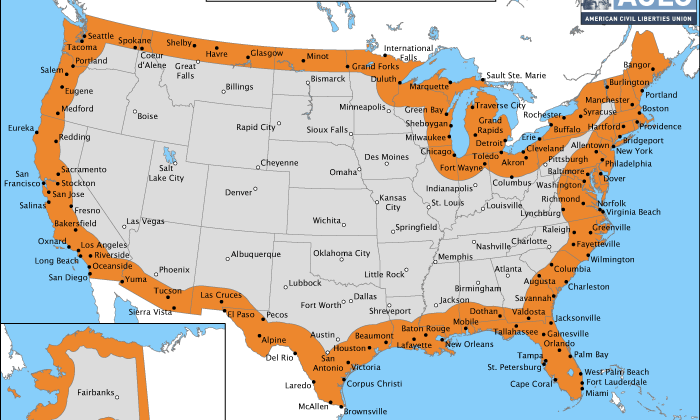New Yorkers, you are one of the 190 million. If you live in LA you’re in the club too. Houston, Seattle, you can definitely tag along. In fact, almost every major metropolitan area – and all those places on the coasts and borders in between them – just hop onboard.
If you roll with this multi-million crew, there are definitely benefits. For one, you often get great beachfront property and easy access to highly concentrated amounts of arts and culture. Also, if you’re caught driving, your laptop can be warrantlessly seized from you to look for child porn.
Wait – what are you talking about?
Okay, okay, take a breath. Let me try to explain. Over three years ago the US Department of Homeland Security (DHS) released a memo, detailing a policy clarification. Intended to respect the “civil liberties and privacy of all travelers while ensuring DHS can take the lawful actions necessary to secure our borders,” the memo wanted to update DHS policy for the modern age. It ensured that just because our property is on laptops and iPhones now, those who are tasked with securing our borders will still be able to seize it without judicial oversight. The stated purpose is to save our country from “child pornography” and “copyright infringement”.
A little background’s good. When we enter or leave the country, routine stops and checks are not only practical, but legally permissible. Under something commonly referred to as the Border Exception to the Fourth Amendment, certain members of the government (Customs and Border Patrol, immigration, etc.) can search us and seize property if they have a “reasonable cause to suspect” that doing that search will lead to the discovery of something incriminating. The idea is that when dealing with the border, customs officials and security personnel don’t have to run to the nearest town, hold up traffic, ask a judge for a warrant, wait and then run back. Makes more sense than most government policy.
But why the hell is this legal concept applicable to New York City residents and citizens throughout the entire state of Michigan? Because what the border means to our government, is not the same thing it means to you.
That memo from three years ago asked the DHS’s Office for Civil Rights and Civil Liberties to come up with an “Impact Assessment” within 120 days. A month ago, they finally came to the (shocking) conclusion that basically everything the DHS was doing was fine and dandy. Specifically, they said conducting “border searches without suspicion or warrant” has a long-standing legal precedent. That is true.
What is noteworthy however, is that in the Immigration and Nationality Act (a 1952 law perennially updated by Congress), the powers of immigration officials to warrantlessly search people in vehicles extends a “reasonable distance from any external boundary of the United States.” This is to guarantee that drug-peddling Speedy Gonzalezes – as the DHS reprehensibly views border-crossers in this racially-charged immigration war – can’t just outrun our immigration officials into the Land of Milk, Honey and supposed-Due Process. In the ‘Definitions’ section of the same document, reasonable distance is defined as up to 100 miles.

Courtesy of Disney and BreakFont
That is what leads to the map you see below. Having asserted their power to ‘respect our rights’ and search not only luggage and trunks for stowed-away illegals, but our electronic devices for porn too, we (or at least 2/3 of the U.S. population) are now at the whim of customs agents who look at our car and think, “Hey, that guy might’ve crossed a border a few hours ago, let’s check out his iPad.”
The DHS has already set up 33 internal checkpoints as of a month ago. Citizens have been forced to leave their train seats, input their laptop passwords and get interrogated about pictures they have saved. San Diegan Vince Peppard had his car ransacked by police dogs without reasonable suspicion, many miles into the country. The contraband he carried: tile.
Scarily, the DHS can even extend the internal border beyond 100 miles if the extension would be convenient due to “unusual circumstances.” This requires no judicial oversight – only a report to be checked off by some higher-up in Customs and Border Protection. “Unusual circumstances” remains unbounded and undefined.
After September 11, America has seen its liberty not only traded, but in some cases put on a fire sale for ‘security’. The PATRIOT Act, NDAA 1021, federal wiretapping, (sigh), etc. If now, “for the children” and copyright holders, we allow DHS checkpoints to pop up wherever a fast car, boat or plane can get to within a few hours of crossing the border, our Constitutional liberties will be under yet another undue attack. If you want to stop smuggling, stop smugglers at the border. If they get through, it sucks, but you can’t just use that possibility to justify searching random cars in San Francisco and Washington, D.C., without warrant. Our Constitutional and human right to be secure in our persons and effects is just too precious for that.

May 27, 2013: This post has been updated since publication.

Great article to go along with this classic YouTube hit: http://www.youtube.com/watch?v=6GvphbbDT1g
Oh my goodness. The last one – where he asks the DHS officer if he’s a citizen before the DHS officer can get a word in – is my favorite.
RT @bkoatz: 33 Checkpoints and counting. Choose: Our 4th Amendment, or more border ‘security’? #RespectTheConstitution http://t.co/YHWUA …
Great article, I agree 100%. The federal government needs to get its shit together.
33 Checkpoints and counting. Choose: Our 4th Amendment, or more border ‘security’? #RespectTheConstitution http://t.co/YHWUAmaFhq